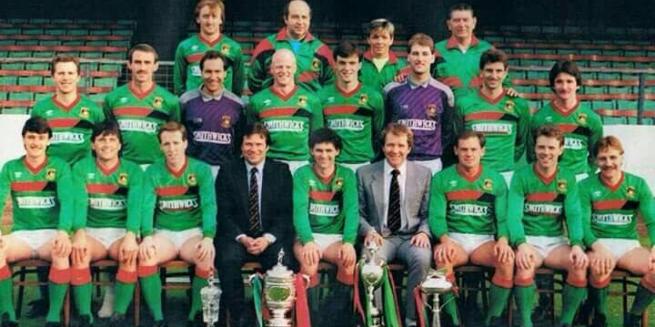
For the third in this series on our league or cup winning managers of the past four decades, we concentrate on our six and a half seasons under Tommy Jackson. In trophy terms, Tommy Jackson is jointly with Roy Coyle, the most successful manager in Glentoran’s history. Ian Clarke spoke to Tommy, still a regular at Glentoran matches.
3. THE JACKSON YEARS (1987-1993)
Part One: To the Double and Beyond (1987-89)
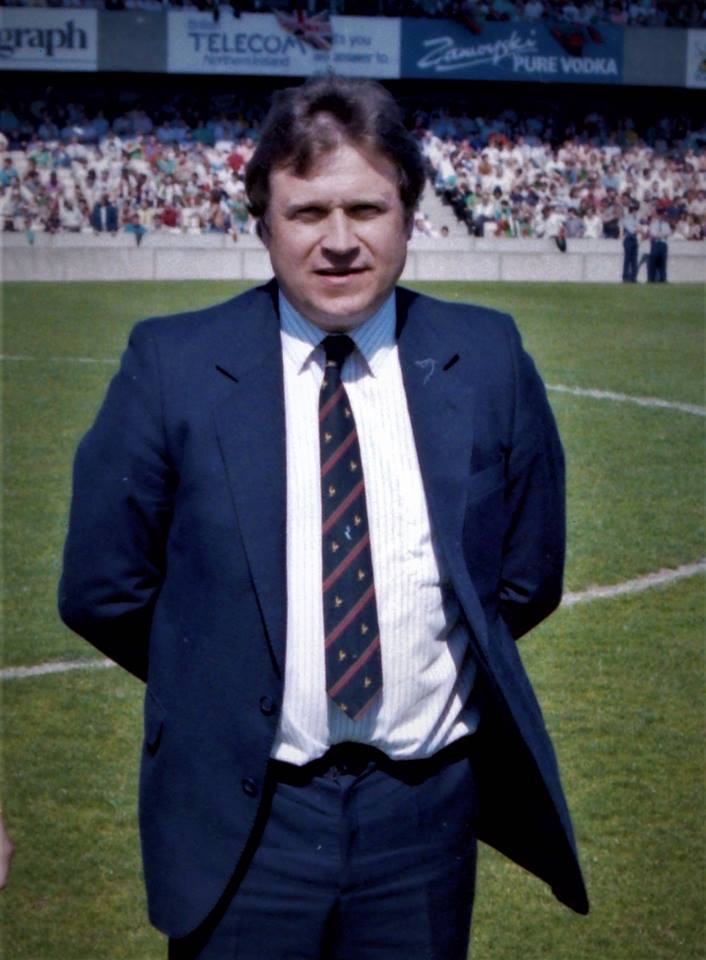
Coming back to the Oval.
There always seemed to be something inevitable about Tommy Jackson returning the Oval as manager. The North Belfast man joined the club as a teenager, working his way through the ranks to make his first team debut at 19 as a midfielder, establishing himself as a key member of John Colrain’s legendary Glens team. Jacko is probably best remembered for his heroic performances home and away against Eusebio when Glentoran played Benfica in the European Cup, or for his contribution to the Detroit Cougars tour. But he also contributed to back to back league titles, not a common occurrence for the Glens!
Jackson’s performances earned him a move to Everton, where he won a League Championship winner’s medal in 1969/70. He then played for Nottingham Forest and Manchester United in the English top division, winning 35 caps for Northern Ireland along the way. He started his managerial career at 32 with Waterford in the League of Ireland, winning the LOI Cup before a spell with Crusaders, winning the Gold Cup in 1985-86 when they beat Glentoran in the semi-final.
Jackson left Crusaders towards the end of 1986 and was the people’s choice when Billy Johnston resigned in January 1987. Jackson succeeded him the following month:
“I’d done a good job at Crusaders and brought in some very good players like Damian Byrne, Kirk Hunter and Robbie Barr. We won the League Cup, beating Linfield in the final. But we lost a couple of good players to other clubs and I didn’t feel the club had done enough to keep them or replace them and that made me feel they were happy to just stay at a certain level. I was a young, ambitious manager so I resigned. Then a few months later the Glens approached me to take over from Billy Johnston. I’d been very happy at Glentoran as a player and they were my club, so I was very happy to come back.
I also spoke to a number of supporters before I came in. I went to the Ballymacarrett Glens Supporters Club and the question that kept coming at me was ‘are you able to beat Linfield’? I told them I was able to do it when I was a player and did it in the Gold Cup Final so I would expect to beat them if I was Glentoran manager. That summed up the problem at the Oval. The club was always obsessed with beating Linfield and I thought that got in the way of things too much. We had to fix that. One of the people who made it really easy for me to come and settle in at the Oval was Big Roy Millar at the Ballymacarrett. He did so much for me and so much else around the Oval, so I was very sad to have to attend his funeral a few months ago. Roy was a great Glenman and he’ll be very sadly missed at Glentoran. The other one who helped me a lot was Club Secretary Gordon Scott. He was very good to work with and we still go to a lot of matches together.”
1986/87: What did Tommy Jackson take over? The Glens were Irish Cup holders for the third season in four and had beaten Glenavon 3-0 to win the County Antrim Shield just four months earlier. His first match in charge saw goals from Gary Macartney, Gary Blackledge and David Keery give us a 3-0 home league win over Crusaders with a starting line-up of Smyth, Stewart, Keery, Bowers, Strain, Cleary, Craig, Caskey, Blackledge, McCartney, McCoy with Jameson and Mullan on the bench. But no matter what Jackson or the players did, the Championship was put beyond reach when in his first week the club was docked eight points for an eligibility issue over Alan Harrison, who had re-joined from Derry City a few weeks before. So, we finished a lowly seventh. Despite the eight points we still lost just one more match than winners Linfield over the season (the usual draws again our weakness) scoring more goals than everyone bar Coleraine. That season finished as they usually did in that era, with an Irish Cup win, this time over Larne with a Gerry Mullan goal settling it. The previous week at the Oval saw Linfield defeated 3-2 in the Gold Cup Final with another late winner, this time from substitute and local boy, Robert Craig.
“There were a lot of great players when I came into the Oval but there were a few who weren’t committed or weren’t working as hard as I wanted in training. I wanted players who were totally committed, so I had to move a few out to make room for others and also to give opportunities to some of the good younger players at the club. Tom Connell lived in Newry and didn’t always train at the Oval. I only wanted who I could work with regularly in training, so I let him go to Portadown. Brian Strain wanted to go to Portadown and that was fair enough as we had Terry Moore, Barney Bowers and Alan Harrison to play at the back plus John Devine was coming through in the Seconds. Philip Major also wanted to go to Ronnie McFall at Portadown. He did well there, and a lot of people asked me about that, but I knew I was persuading George Neill back from playing rugby and he was always going to be first choice at right back. After a while I also let Blackie go to Glenavon. He’d been a great player and goalscorer, but he’d had a lot of injuries so by the time I came in, he didn’t have the speed and movement I needed. Also I felt he wouldn’t get past Macartney, Mullan and Manley into my team. Of course in his first game back at the Oval he scored a hat trick against us, so he got that one over me!
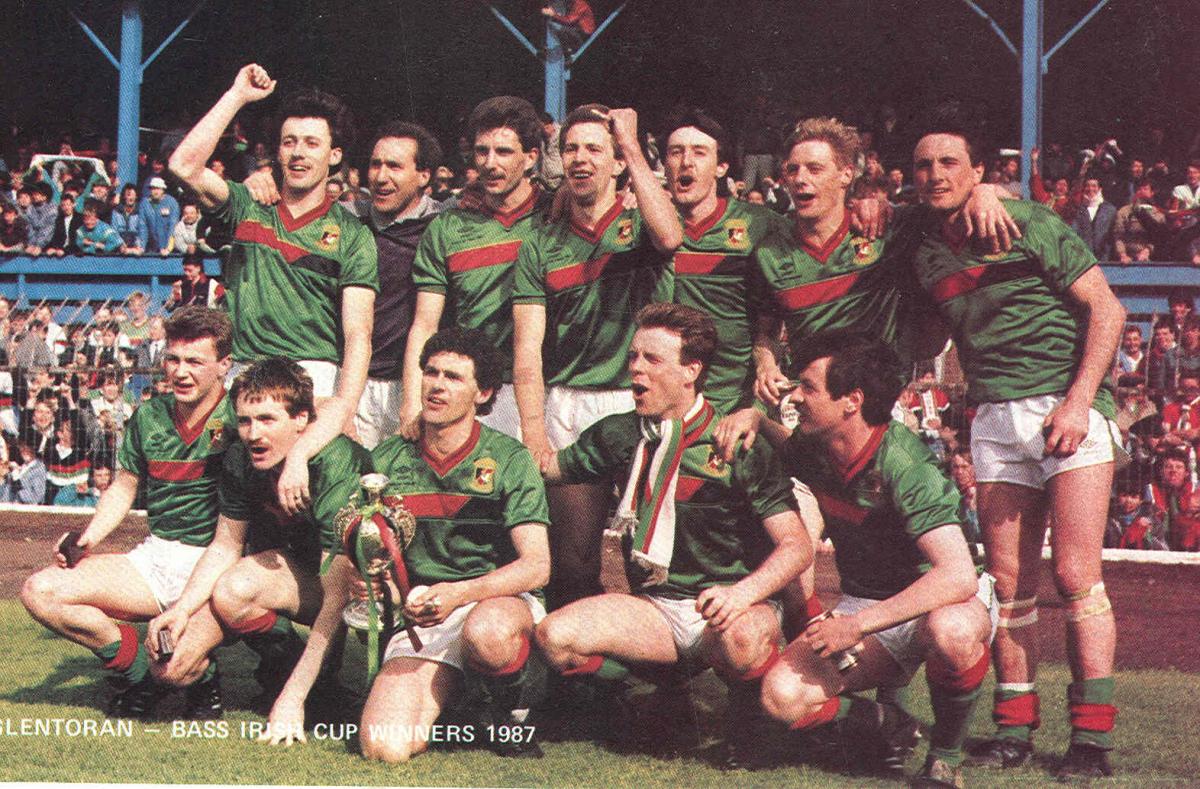
Irish Cup Winners 1986-87
Losing the 8 points was a blow so early on, but it gave me a chance to work with the players we had, with a couple of trophies still to play for. Some people said the players were too old when I arrived, but Billy McCullough and I told them they were better than they were showing, and we thought there was a big confidence issue in the league. They responded well. We even got Jamie tackling and going through people!
Winning the Gold Cup Final against the Blues that first half season was a very important breakthrough for us. I thought we quickly learned to stop looking over our shoulders at the Blues and learned to exploit their weaknesses. Wee Craiger got the winner that day Robert was a very good player, but he was unlucky to be up against a player like Jamie for that position. We tried to play him out left a few times, but we had Jim Cleary getting forward from there and he was hardly going to be dropped.”
1987/88: Tommy Jackson’s first full season delivered something Glens fans hadn’t seen for 27 years, the Double. It wasn’t the most active close season from an incoming perspective with defender Norman McGreevy following Jackson from Crusaders and winger David Montgomery signing from Carrick. Six first team squad members departed, four (Tom Connell, Paul Millar, Brian Strain and Philip Major) to Portadown, David Keery to Crusaders and Paul Dixon to Derry City. A Raymond Morrison goal won the Budweiser Cup Final against Coleraine in December and with five players in five figures (led by Gerry Mullan in his final season) goalscoring wasn’t a problem. That was the defence. George Neill had come back at right back after a season playing rugby and Alfie Stewart was well settled at left back. But getting a partner for Terry Moore in the centre was an issue. Alan Harrison was injured away in Europe in September and didn’t start a league game. Then Barney Bowers suffered a broken leg after just one league game. Finally, Norman McGreevy picked up a bad injury just before Christmas. So, on Boxing Day there was a certain trepidation when Jacko handed a debut to an 18-year old centre back who we’d never heard of, one John Devine. It worked like a dream. Devine barely put a foot wrong and stayed in the team pretty much for the next twelve seasons.
“Pat McCoy had been with me at Crusaders and was a very good midfielder. Then I brought Norman McGreevy in from them. People weren’t sure about McGreevy but he filled a hole for us that season in a number of positions. You need players who can do that, and he made a big contribution that season, even if he didn’t always start.
That Double season the penny dropped with some of the players who’d been there a few years. They knew what they had to do, even against some terrible tackling, and kept their heads so our disciplinary record was very good. They were great in training. The players were such intense competitors that we never played even 5-a-side matches in training because they’d have injured each other. Casko even hurt himself challenging me in training once. Casko was incredible. How he kept going week after week for so many years I’ll never know. He meant so much to the supporters. Towards the end of a season like that there are always a lot of niggly injuries that can get aggravated into something more serious. George Magill was our Physio and sometimes late on he had more players in his room than I had training. He’d tell me who I could pick, and I never questioned him, even if I was tempted. There’s no point risking longer term injuries with good players.
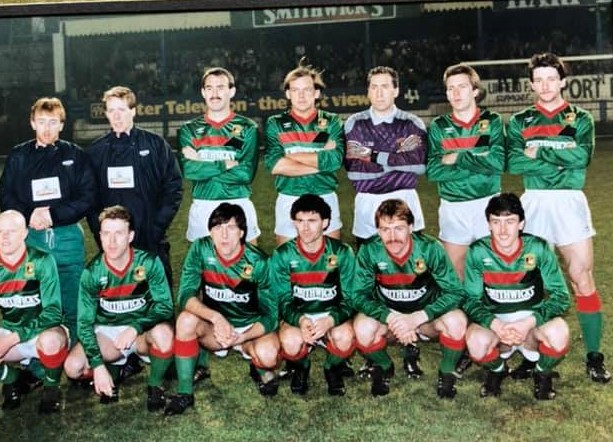
Budweiser Cup Final, December 1987
We really encouraged Cleary, Caskey and Morrison to get forward. Nuts was fantastic too. But all season he never scored from a corner. We’d worked out a routine that he followed week after week, but it never came off for him. Not until the last match of the season when we needed a goal to clinch the league at Coleraine. Then it came good when we most needed it, but that was just the nature of Nuts. A great player. Gerry Mullan was magnificent too. He travelled from Limavady twice a week, never missed training and never complained. He got 3 or 4 hat tricks that season out of 28 goals. Macartney, Manley and Jamie were also lethal. Ron Manley was a very dedicated player. I thought injuries had wrecked him by the time I came in and I was ready to let him go. But after he asked me for a chance, he really turned it round, scored a lot of goals for us and I was glad we let him stay. A great lad too”.
1988/89: Immediately the season finished, the Glens announced the signing of Gary Hillis from Crusaders. Hillis had come through the ranks at the Oval before establishing himself at Seaview under Jackson. With top scorer Gerry Mullan, off to Coleraine and Gary Blackledge now at Glenavon, Hillis was expected to compete with Ron Manley to partner Macartney the next season. Another major blow was the unexpected loss of Alfie Stewart to Portadown. So, Jackson had to plan for retention without the top scorer and player of the year from the double winners. Joining Hillis from Seaview was winger Billy Totten and young Linfield left back Brian Kennedy. Sadly, Hillis was injured in pre-season and didn’t start a competitive match until the end of November.
“Losing Alfie Stewart after the Double season was a bad one. He’d done well for us in midfield then turned into a very good left back, so I wasn’t happy to lose him. Alfie lived in Maghera and was always unhappy about the amount of travelling involved. The Glens had always looked after him well over training, so it was very disappointing when he left us for Portadown, with twice as much travelling! We struggled for a while to replace him before Conor McCaffrey came through. I’d wanted Gary Hillis for a long time as he was a different forward from what we had with his ability to hold the ball up. I’d taken him from the Welders to Crusaders so was pleased to get him again. Then he got hurt in summer so that soured my relationship with him for a while. But he came back well from that and became a very important player for us for the next few years. Gary’s a great lad and still a good friend. I sit with him and Raymond Morrison a lot at Welders matches when the Glens are away.
The Glens head off to Moscow in September 1989
The retention got off to a great start, taking 28 points from our first 11 matches. But from the New Year we dropped 11 from our next 6 to put us well behind Linfield. That was the only bad patch in the season, but it also saw us lose in the Irish Cup for the first time in four years, to Linfield at home. So, we finished the league in second place, ten points behind Linfield, though again were the division’s top scorers. Our strength in knock out tournaments continued as we picked up the Ulster Cup with a Ron Manley hat trick in the final against Larne, and the League Cup, with Alan Paterson’s famous end to end winner over Linfield. As the season progressed, two other significant signings were made, the expensive signing of left winger Tom Cleland from Distillery and what was to prove a very important signing in right winger Raymond Campbell from Nottingham Forest. However, it was the last season of our captain and one of the greatest players ever to wear the shirt, as Jimmy Cleary retired after nine magnificent seasons. He bowed out with 25 goals in what I believe was possibly his finest season ever.
“I’d played for Nottingham Forest for a few years, so I had plenty of contacts there. Martin O’Neill actually recommended Soupy Campbell. He called me and told me Forest had released a very good right sided player, but he played on the left. That wasn’t ideal but I’d struggled to get someone to play there and I knew Jim Cleary was retiring at the end of the season, so I thought he was worth the chance. He did very well for us for the rest of my time there and he’ll always be remembered for that goal against Linfield at Windsor. I was away by the time he left Glentoran but there’s something about a player leaving the Glens for Linfield that never sits well with me and I know that soured things between him and the supporters.
There’s not a lot left to say about Jim Cleary. He was just a great player, great trainer and great lad. In all the time we worked together we never had a single cross word. He was very honest with me about retiring. I tried to talk him round, but he’s had a great, long career and he just felt it was time to do something different with his family. It’s a long time to give up so much family time to football so I could see his point. He was a wonderful player and a great captain, right up to the very end.”
Part Two: 7-UP!
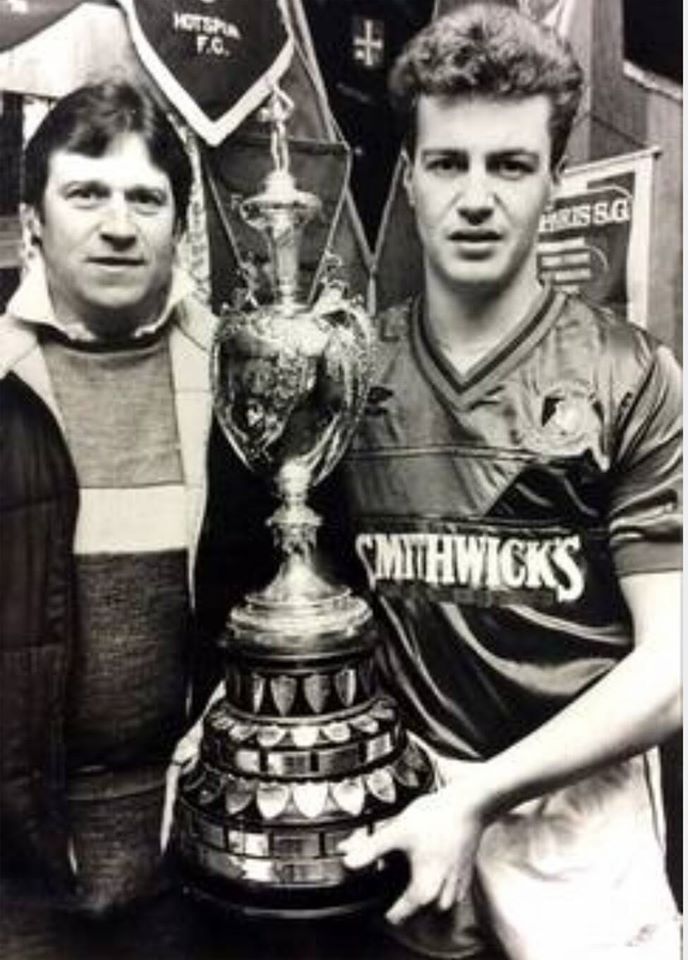
Tommy with Robert Craig




